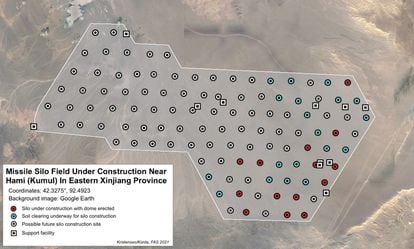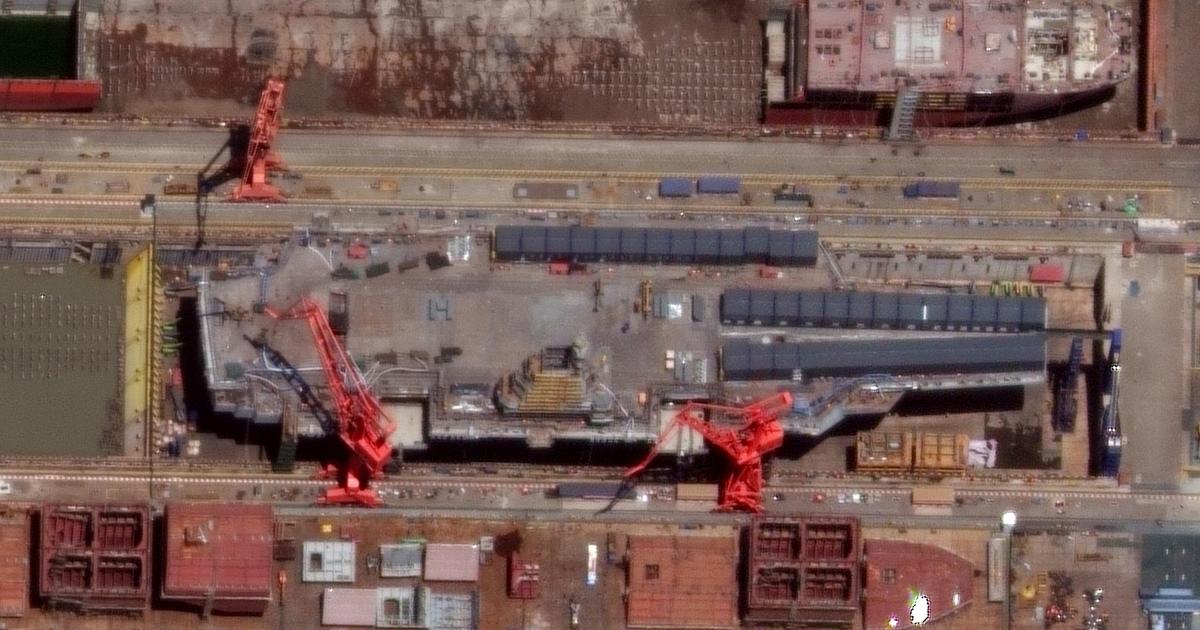Washington's concern over China's aspirations in the nuclear race has gained momentum. A report by the Federation of American Scientists (FAS) warns that the Xi Jinping regime is building a new network of silos for the launch of nuclear warheads. The analysis, published last Monday, includes photographs taken by satellite and places the project in the northwest of the country, in the Xinjiang region. The researchers estimate that the field can hold up to 110 silos. Just a few weeks earlier, on June 30,
The Washington Post
echoed another paper by the James Martin Center for Non-Proliferation Studies that spoke of 119 other silos near the city of Yumen, a desert area.
Both reports point to a change in strategy by China, whose nuclear capacity today stands at about 350 nuclear warheads, according to FAS researchers, a modest number when compared to Russia or the United States, which each operate warehouses of up to 4,000 heads, 90% of the planet's nuclear weapons.
The Chinese regime, still far from those figures, is pressing the accelerator.
The Pentagon calculated a year ago that their stocks were below 200 heads.
Image of the network of missile silos in the Hami area of the Xinjiang region.
Source: Federation of American Scientists (FAS)
On Tuesday, the day after the latest report was published, both the Pentagon and members of Congress drew attention to this matter.
"This is the second time in two months that the public has discovered what we have been saying all this time about the growing danger that the world faces and the secrecy that surrounds it," the United States Strategic Command noted on its Twitter account. the arm of the Army with the mission of protecting the country and its allies from the nuclear threat.
On the other hand, Republican Congressman Mike Turner, a representative from Ohio and a member of the House of Representatives subcommittee on Armed Services on Strategic Forces, called the nuclear development of the Chinese regime a "threat."
More information
China's military industry grows by leaps and bounds
The United States and Russia seek in Geneva to renew nuclear arms control agreements
These two reports were released on the eve of the first round of negotiations, called the Dialogue on Strategic Stability, which the United States and Russia held in Geneva on Wednesday to seek the renewal of the agreements on nuclear control.
This is the first meeting of this type between the two powers in a year after the summit following the June 16 summit between presidents Joe Biden and Vladimir Putin in the Swiss city.
The atmosphere of the meeting, led by the Deputy Secretary of the State Department, Wendy Sherman, and the Russian Deputy Minister of Foreign Affairs, Sergei Rybakov, had heated up in the last hours.
Join EL PAÍS now to follow all the news and read without limits
Subscribe here
Sherman, who landed in the Swiss city from Beijing, has had to listen to complaints from the Chinese authorities accusing Washington of creating "an imaginary enemy" to distract attention from its internal problems and repress China, Reuters reports. The Beijing government assures that it is willing to hold bilateral talks on strategic security "from the bases of equality and mutual respect" and underlines that its atomic arsenal is very small compared to that of the other two superpowers.
The Kremlin, for its part, has responded to Biden after the US president affirmed on Tuesday that Moscow only has nuclear weapons and oil and that it is increasingly likely that Washington will end in a real gun war with a major power "as consequence of a large-scale cyberattack. His spokesman, Dmitri Peskov, assured this Wednesday that the US president's statements are exaggerated and denote the lack of knowledge of the country.
Despite this climate, the State Department has described the Geneva negotiations, from which immediate results were not expected, as "professional and substantial" in a statement also informing that both parties have agreed to meet again in September. Rybakov, quoted by the official TASS agency, has declared himself satisfied with the meeting and with the White House's willingness to maintain a constructive dialogue. Although the official agenda is not known, experts point out that China, atomic proliferation, the militarization of space or cyberattacks should be part of the dialogue. “The talks must lead to real and substantial denuclearization. Anything other than that will be irresponsible, ”Daniel Hogsta, of the Campaign to Abolish Nuclear Weapons, told Reuters.Biden and Putin agreed this year to extend until 2026 the 2010 New START treaty, which limits the number of nuclear warheads deployed by Russia and the US to a maximum of 1,550 and 700 ballistic systems on land, sea and air.










/cloudfront-eu-central-1.images.arcpublishing.com/prisa/KMEYMJKESBAZBE4MRBAM4TGHIQ.jpg)


